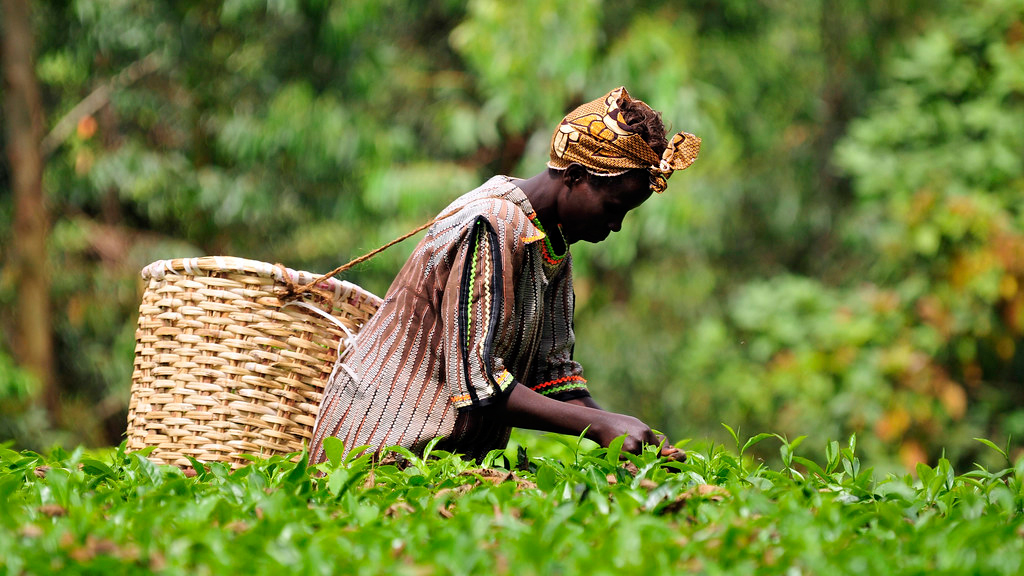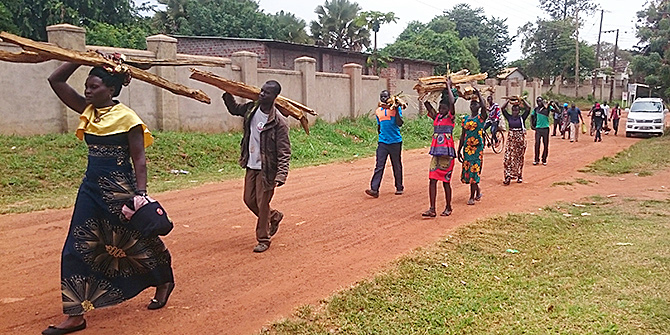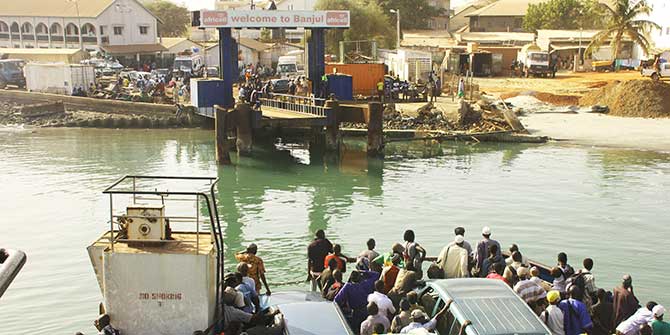Two studies in the current issue of the Journal of Eastern African Studies re-visit the fascinating debate about justice and reconciliation in northern Uganda, nearly ten years since the fighting between the Lord’s Resistance Army (LRA) and the Government of Uganda (GoU) stopped on Ugandan soil, as Anna Macdonald, Holly Porter and Letha Victor discuss in this article.
This article is part of our Displacement and Return series, which features blog posts around the themes being explored in two Firoz Lalji Centre for Africa projects. Politics of Return is an AHRC/ESRC PaCCs-funded project which explores the dynamics of return and reintegration of refugees in Central and Eastern Africa. Trajectories of Displacement is a multi-disciplinary exploration into return and social repair after mass displacement in northern Uganda, funded by a ESRC-AHRC research grant from the Global Challenges Research Fund. Follow all updates on the project on Twitter and Instagram through the hashtag #LSEreturn.
It has been nearly ten years since the ‘guns fell silent’ in northern Uganda but inevitably the legacy of the long, devastating conflict between the Lord’s Resistance Army (LRA) and the Government of Uganda (GoU) continues to shape people’s lives. The LRA relied largely on abduction to fill its ranks and, although figures are contested, the most trusted estimates (developed by Jeannie Annan and Chris Blattmann) tell us that at times roughly 80 per cent of the LRA was made up of abductees, four-fifths of whom were under the age of 18.
A lot of people were displaced during the 20-year war, which ran from roughly 1986-2008. At one point it was estimated that more than 90 per cent of people in the Acholi sub-region, the epicenter of the conflict, were living in utterly horrendous ‘internal displacement’ camps. Most had been forcibly re-located by the government, which wanted to create free-firing zones. Humanitarian organisations should have objected but they did not: it was probably easier for them to administer aid in bounded zones.

Restricting the civilian population to camps was a counter-insurgency policy that had untold impacts. The camps were regularly attacked by the LRA, meanwhile the Ugandan Army (UPDF) failed to protect civilians and perpetrated plenty of human rights abuses of its own. Children were born in these camps. Young people came of age there. Older generations lost their autonomy in these ‘rural prisons’, they could not farm, they could not live with dignity: it was, as Chris Dolan has argued ‘social torture’. People of all ages died there, often of disease. In fact, Tim Allen and Koen Vlassenroot argue that crude mortality rates collated by Medicins Sans Frontieres (MSF) and the World Health Organisation in the camps in the early 2000s ‘were of an order that might be anticipated in an extreme emergency’. For those who were abducted by the LRA or who stayed in the camps (many people, of course, experienced both), and for those who managed to avoid such horrors, most people in the Acholi region remain affected by the painful legacy of the war and of the injustice that characterises it all.
In the current issue of the Journal of Eastern African Studies we publish two papers that explore attempts to negotiate that injustice, from very different perspectives. Anna Macdonald’s article: In the interests of justice? Peace talks, the International Criminal Court and the failure of war crimes accountability in northern Uganda re-visits a much-debated intervention in northern Uganda: that of the International Criminal Court (ICC) and its efforts to hold the LRA to account for war crimes committed during the conflict.
The Ugandan government (a state party to the ICC) referred the case to the Court in late 2003 and arrest warrants were unsealed for five LRA commanders (including leader Joseph Kony) in 2005. This was the ICC’s first case and it was highly controversial. When peace talks began between the two sides in Juba, South Sudan in 2006, the warrants came to be seen as a massive blockage to progress. There was, understandably, a ‘hyperactive’ debate at Juba and beyond about the relationship between peace and justice and whether it was fair that only one side in the conflict was being held to account.
In line with recent scholarship, Macdonald’s article departs from the peace versus justice debate per se, and focuses instead on the motivations guiding the LRA/M and GoU at Juba with regards to the justice issue. She finds that at the level of broad rhetoric, the presence of the court created significant discord between negotiating parties. On a practical level, however, it actually created space for consensus, but not the type envisaged by international justice promoters. The court came to be seen by both sides as an intervention that needed to be contained and controlled. This resulted in the politically expedient Agreement on Accountability and Reconciliation and its implementing framework, which showcased an inventory of transitional justice measures, but was based on a shared desire to evade the jurisdiction of international criminal justice. This was a document designed, as one mediation team adviser said, to ‘protect’ the parties from war crimes justice: to circumvent the jurisdiction of the ICC, by invoking a range of other accountability and reconciliation measures from the much touted transitional justice ‘tool-kit’.
This empirical study of the justice and accountability negotiations at Juba suggests that we need a much better understanding of how ‘transitional justice’ is actually co-opted by elites during negotiations, and re-produced as a form of what Stephen Brown calls ‘subterfuge’. During negotiations, and against the spectre of the ICC, it is a malleable and easily captured notion and repertoire of ‘processes’ that can be harnessed in an attempt to deflect international criminal proceedings. Given that this was the spirit in which the Agreement on Accountability and Reconciliation was drafted and signed by both parties, it is hardly surprising that Uganda’s transitional justice framework remains pretty much a dead letter today, despite donor funding and efforts by Ugandan civil society and certain civil servants to keep it on the political agenda.
So, if the amorphous and hard to define notion of ‘transitional justice’ remains an abstract idea, a norm, an unrealised ambition, then how are people negotiating the legacy of the war in northern Uganda? Letha Victor and Holly Porter take us away from mega events like the ICC referral and the Juba talks and into the every-day struggles of former LRA combatants as they try to ‘re-integrate’ into former communities in the aftermath of war. In their article: Dirty Things: Spiritual Pollution and Life after the Lord’s Resistance Army, they focus on ex-combatants who were part of a bigger study of clients at an ex-combatant reception centre, who described suffering from spiritual ‘pollution’ from the war—or ajwani (“dirty things”)—related to the often discussed notion of cen. In some ethnographic detail, the article explores how these ex-combatants and those around them have interpreted and responded to these experiences. Many tried ‘getting saved’ or seeking help from traditional healers/diviners. The study finds most ex-combatants and their families to be flexibly oriented towards remedy, ritual work, social repair, and the alleviation of suffering, no matter their religious affiliations or lack thereof. Those individuals who find themselves most unaided by available channels of support are those who approach existing structures of spiritual authority with no “belief,” while medical and psychological services are found woefully inadequate. For others, their ailment has become an opportunity for transformation, new beginnings and new sources of social support.
Pathways taken with the goal of lessening suffering caused by war are tread by Acholi civilians and ex-combatants alike, and the ways former Lord’s Resistance Army fighters attempt to alleviate spiritual distress illuminate wider struggles for moral authority in everyday life. These practices are embedded in cosmologies which, though predating the twenty years of violent upheaval that ended in 2006, are sites of contestation where the politics of belief and doubt are played out. Where life and death have been polluted by violence, wrongdoing, and cosmological transgressions, the pursuit of social and cosmological order is embroiled in the politics of belief and doubt. In the wider context of post-war Acholi, effective and socially acceptable alleviation of spiritual suffering is contested, processual, and highly constrained by material resources and perceptions of ritual legitimacy. The practices of belief and doubt are not only a matter of metaphysics or ontology, but of shifts in worldly power.
Taken together, the articles hope to demonstrate the sheer complexity of what justice, accountability, reconciliation and social repair might mean in context, and the ever shifting and contingent power and cosmological dynamics that both shape and constrain possibilities for ‘moving on’ against the backdrop of such profound suffering.
Find out more about the Politics of Return research project.
Anna Macdonald is Research Fellow at the Firoz Lalji Centre for Africa.
Holly Porter is Research Fellow at the Firoz Lalji Centre for Africa and a FWO [PEGASUS]2 Marie Skłodowska-Curie Fellow with the Institute of Development Policy (University of Antwerp) and the Conflict Research Group (Ghent University).
Letha Victor is a PhD candidate and doctoral fellow in socio-cultural anthropology at the University of Toronto.
The views expressed in this post are those of the author and in no way reflect those of the Africa at LSE blog, the Firoz Lalji Centre for Africa or the London School of Economics and Political Science.





